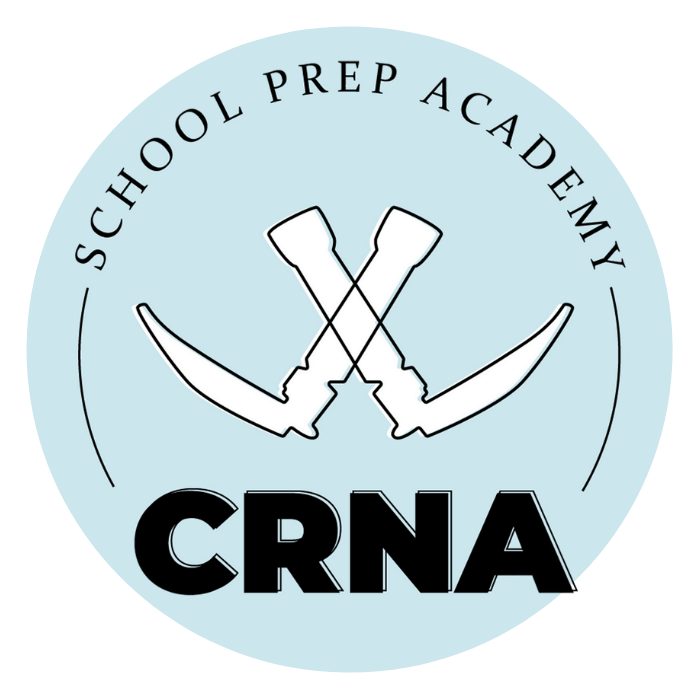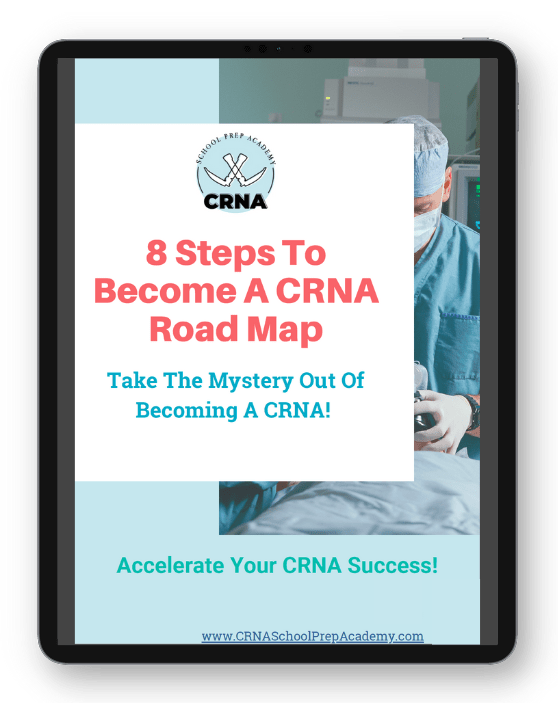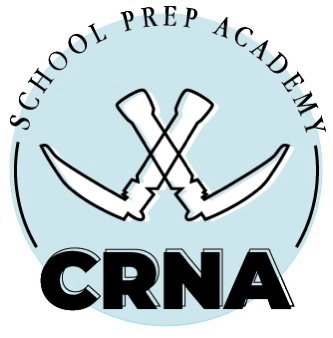
If you are currently in nursing school and planning on pursuing the CRNA career path, getting started with your prep TODAY is critical! Starting as early as possible gives you the best chance for success and helps you avoid unnecessary pitfalls along the way to CRNA.
Today, we talk about our top tips for starting NOW and becoming the most competitive candidate you can be. By taking steps to lean into your fear, embrace your self-worth, and know that you were MADE for this, you will reach your dream!
In this episode, we dive into –
- The best tips for assessing your study habits WHILE you’re still in nursing school (and finding what works for you)
- The importance of taking your courses seriously (especially your core sciences and math)
- Why you NEED to begin your school research as early as possible (including attending open houses)
- Why shadowing experience is critical to your admission into CRNA school (and how to document it along the way!)
- Making a commitment to learning about CRNA and ICU (as well as your own personal strengths and weaknesses)
- The mindset required to become a competitive candidate for CRNA school (and why you shouldn’t listen to the nay-sayers!)
- How to use potential set-backs as stepping stones for growth and success
So, pop in your headphones and press play, future CRNA! Know that you are smart enough, capable enough, and unique enough to make your dream of CRNA a reality!
Grab your FREE Shadow documentation Form here! https://www.cspaedu.com/j814jsxq
Access the Simulation Experience here! https://www.cspaedu.com/xd1qcbzr
Get access to planning tools, valuable CRNA Faculty guidance & mapped out courses that have been proven to accelerate your CRNA success! Become a member of CRNA School Prep Academy here:
https://www.crnaschoolprepacademy.com/join
Book a mock interview, resume edit or personal statement critique:
Join the CSPA email list: https://www.cspaedu.com/podcast-email
Send Jenny an email or make a podcast request!
Hello@CRNASchoolPrepAcademy.com
—
Watch the episode here
Listen to the podcast here
Actions You Can Take Now As A Nursing Student To Achieve Your CRNA Dream
We’re going to talk about what some things are that you should know as a nursing student to plan and implement your journey into CRNA school. A lot of you are exploring this career path, which is awesome. High five to you. The earlier, the better. The sooner you decide to pursue CRNA, the better it’s going to be because you’re going to learn how to avoid some common barriers that students often face if they choose to do this career path later on.
There Will Be Doubts
One thing I will start off by saying about this episode is that I see a lot of nursing students question their abilities early on. I myself am included in this category that I thought about CRNA early on in nursing school, but I thought, “No, that’s not possible, Jenny. You’re not smart enough.” That’s what I thought. It’s unfortunate that I did that to myself. It wasn’t until later in my nursing school career, probably more towards my senior year and junior year, that I finally decided that I had to give it a shot because that desire and passion never went away.
I finally was like, “What’s it going to hurt to try?” If you’re reading this, I am speaking to you. I know you’re here because you are interested in CRNA and want to learn more about the career path, but maybe you’re doubting yourself. Let’s start this episode off with some positive reinforcement and telling yourself to give yourself that chance. Embrace the fears that you may be thinking or feeling about becoming a CRNA. My first piece of advice as a nursing student is to take ownership of the fact that you have control of the decisions you make now that will impact you later on.
Another common mistake I see nursing students make is “Cs get degrees”. That language kills my soul. I hear mentors say this to students, and it is so unfortunate. If you have heard this, I don’t care who you’ve heard it from, act like you’ve never heard them. Block it out of your brain. It’s terrible advice. I don’t know who came up with that saying, but it’s awful. I wish it wasn’t circulating so frequently in our media and in general. Talk about killing your future by accepting the fact that Cs get degrees. I’m not saying Cs are the end of everything. I’m not saying if you get Cs that you’re not capable of becoming a CRNA, so please do not misinterpret this.
Some courses are harder than others. You may have gotten a C. I myself had a C in Organic Chemistry. It kicked my butt my freshman year. I was super upset about it, but there was nothing I could do. I tried and couldn’t get anything better than a C plus. Move on. However, that was during my freshman year in nursing school.
I will be quite honest with you guys. When I entered college, I did not know how to study efficiently for myself. I was able to get by with Bs and Cs in high school by doing what I thought was effective studying. The first thing you should be doing, if I’m speaking to you around this topic, is assess your study habits. This should be happening while you’re still in nursing school.
Even as you’re transitioning from high school to nursing school, you need to be understanding your study habits, what works for you, and what doesn’t work for you. Unfortunately, at least in my experience, high school didn’t challenge me in that way to figure it out. I accepted that I was a B student, and I was okay with that. I would occasionally get an A in Home Economics; not if that was a Calculus course, which I ended up dropping out of to take home economics during my senior year in high school.

The harder the classes, I tended to get a B, and the easier the classes, I got an A. My overall GPA worked out to be right around a 3.4 because the easy A’s offset the harder classes, which were Bs and sometimes Cs. That being said, I never challenged myself in high school to understand where my problems were as far as my study habits and my routine.
Explore Study Techniques
I accepted that I was reading books and practicing the study guides the teachers would give, and a B was what I could get. That was my first mistake. When I entered college, the rigors of college were tenfold. I quickly realized, “What worked for me back then is not working for me now.” It took me that first year of getting my butt kicked a little bit to realize, “I need to figure out a new strategy because this is not working.” I know I’ve shared with you guys this in the past too, but I also found out in the middle of my high school career that I had a mild form of dyslexia. I will say my dyslexia is mild. However, it has hindered me in my ability to comprehend reading.
In general, my learning strategies sometimes have to be pretty unique because I am a unique learner. We all are unique learners. Just because you have something like this does not mean you are not capable. Please, believe in yourself. You can do it. You have the same brain as everyone else. You have the ability to learn. It’s a powerful tool. You just have to learn how to use it efficiently for yourself.
Explore and challenge yourself to explore different study techniques. Figure out whether you like using highlighters. Not just highlighters. Do you like different colors of highlighters? Explore study techniques. I was trying to figure this out when I didn’t get into nursing school my freshman year, I barely had a 3.1 at the end of my freshman year. I got rejected from the college of nursing.
I had a couple of options. I’d go home and live with my parents, which was terrifying because my dad is strict. I was like, “There’s no way I could live at home.” I love you, dad, but there’s no way I could live at home in college. It was scary for me at that time. I wanted to stay at Ohio State. That was my dream school. I thought, “My other option is to figure out how to get straight A’s, which I’ve never done before.” That’s a little intimidating. It’s something I’ve never done before and didn’t know if I could do, but I figured, like CRNA school, I owned the fact that I had to give myself that shot.
I had to take that. I had to try. I did, tried, and googled every study technique that I could find on Google. I tried them all, including listening to my notes while I slept. I recorded myself speaking my notes, or I took my little recorder to my classes, sat up front, and recorded the teacher speaking because back then, they didn’t have these nice pre-recorded PowerPoints that I’m sure they do these days.
I would put it on replay. As I fell asleep, I would listen to it. I thought maybe that would help me study. I don’t think I kept that study technique long, but I tried it, meaning I was open to trying new things. I encourage you to explore to see what works and what doesn’t work through that challenge of trying to figure out what works.
Embrace the fears that you may be thinking or feeling about becoming a CRNA. Take ownership of the fact that you have control of the decisions you make that will impact you later on. Click To TweetI discovered that handwriting my notes was the best way for me to memorize, not just by reading. I discovered that I like colored highlighters, not just yellow. I had to mix it up, meaning my books look like rainbow sheets. When I would recall something for a test, I could remember what I highlighted in blue, pink, green, orange, that kind of thing. I discovered that through trying it.
I also discovered that if I listened to my notes on the way to a test, I would replay it in my ear as I walked to a test, then I would do well on that test. However, for the midterm and final, I would not do so well. Essentially, cramming didn’t help my long-term memory. I tended to do better on initial tests than I did on finals. I had to shift my technique in how I could make memories last longer.
What I discovered is I had to do something called interleaving, which is where you connect different aspects of your learning to other topics. It creates a foundation and a base. If you want more study techniques, since I don’t want to go too far into this topic in this episode, I do have an episode on study techniques. I encourage you to search down through the list of podcast episodes; I have a couple of them now because that is a popular topic.
Challenge Yourself
Search through my episodes for the study technique episodes and learn more about them there. Challenge yourself in regards to how you learn. You need better than Cs. I’m going to be completely honest with you guys. If you get all Cs in nursing school, it’s going to be extremely hard to ever get any CRNA school to open their eyeballs to even interviewing you.
When you’re applying to CRNA school, you need to get an interview. That’s how you get in. You can’t just apply. You have to interview. To get an interview, you have to be competitive. Competitive students don’t have Cs. Don’t adopt the Cs get degrees. Start off with your nursing career gung ho. Do as best you can. Try to get A’s as much as possible. It’s okay if you get a C here and there, but assess why that happened.
Assess what you could do differently so that it doesn’t happen again. You could probably recover from a C, but if you’ve got 2, 3, 4, or 5 Cs, especially if it’s in your core science courses, it’s going to be extremely hard to ever recover from that. Please, as a nursing student, go into nursing school, start nursing school, and take your first year as seriously as possible. Know that they highly evaluate your core science courses, which are your Microbiology, Biology, any kind of Biology, Chemistry, any Chemistry, Math, any Math, Algebra, Statistics, any of that, and Anatomy, Pathophysiology.
Whether your Anatomy is separate or combined, they look at those science courses because the CRNA curriculum is extremely heavy in the sciences. To them, that’s a good indicator of what type of student you’re going to be in CRNA school. You may be thinking, “Jenny, my Nursing degree was many years ago.” Just so you know, most schools have a 5 or 10-year maximum in your science courses. Most schools are 10 years, but a few schools are 5 years, which essentially means you need to graduate and plan for CRNA right away. If it’s been 10 years, a lot of schools make you retake those core sciences. This is why you need to start doing your research early on, which leads me to my next piece of advice.

Get A Good Headstart On Research
If you’re in nursing school and you’re considering CRNA, do your research early. It’s not too early to start researching schools and attending open houses. Attend the open houses. They’re free. Go to any schools you may be applying to and look to see when their next open house date is and go. A lot of times these days, they’re virtual. I know back when I was researching schools, there were no virtual events. I had to go to it.
The only closest CRNA school was two and a half hours away from me. I never went. I should have, but nowadays, the fact that so many things are virtual, it’s so easy to make the time to attend these sessions. I know Case Western does sessions almost every single month. These schools are trying to give you this information.
Shadow When You Can
It’s up to you to seek out the information, take the initiative and make time to go. Go to the open houses. Number one, assess your study habits. Cs do not get degrees. Secondly, go to these open houses. Start researching your schools. Number three is to shadow. I know this is hard because of everything going on. I am praying like everyone that this is going to come to an end sometime soon.
The reality is this is the world we live in. Shadowing has become extremely difficult. It was already difficult, unfortunately, to begin with. This has sometimes made it almost impossible for students to get this experience. That is sad. It’s heartbreaking. I don’t have any magical solutions. However, these are some things you can do to help you gain the shadowing experience.
You need to solidify this career. Do not wait until you are applying to CRNA school to gain shadow experience. The reason is because it looks like you’re checking a box, meaning, “I have to shadow to apply. I’m going to go ahead and shadow.” You’re already all in to apply to CRNA school without ever seeing what we do in real life. That could be seen as a problem for schools, meaning they want to make sure that before you invest the time and money to attend their program, you are serious about pursuing CRNA so that you don’t get accepted, start clinicals, and realize, “I had no idea as to what CRNAs do. I don’t want to do this.”
Yes, that does happen. They assess whether you shadow. If you’ve shadowed more than once over a period of 2 or 3 or 4 years, it’s going to show determination, persistence, desire, and drive to pursue this. They’re going to know that you truly want this, versus if you just were to shadow a month prior to your application deadline, it’s going to say, “You were already actively applying prior to ever seeing what this profession was like.”
If that’s you, I’m not poo-pooing that you need to do it. I’m not saying schools are going to see that and automatically write you off as not a good candidate. Please don’t interpret it that way. I’m saying that from their perspective if they see persistence over a period of time, they’re going to know that you’re a more serious candidate.
If you've experienced rejection, keep going, and find out why. And if you can't find out why, seek out resources that can help you figure that out. Click To TweetDocument Your Experience
They will still interview you if you have everything else in a shadow experience, even if it was the week before your application was due. That being said, they say, “This person clearly has been more invested in this career path for much longer because they have several shadowing experiences that date 4 or 5 years ago.” The other problem that I see a lot of students get into is they don’t document their shadow experience early on.
Even though they may have done it, these schools don’t know that. The only documentation they have is the one they need prior to applying. That’s unfortunate. If that’s speaking to you, I have a free shadow documentation form I want you to grab, print it out, and keep it with you so that when you get your shadowing experience, you can remember to bring it with you on the day.
Document it and submit it for your application to CRNA school. Even if it’s ten years down the road, submit it as extra documentation. This will help you, and it will show your persistence. It also will give you insights as to what are some things you should be looking to gain from this experience and what are some things you should be trying to observe during your shadow experience.
What I also will say about shadowing is the more times you do it, the more you’re going to walk away with from it. I encourage you every time you shadow to reflect on that and write your big takeaways. Every time you do it, document this experience and compare because you will have grown so much from your first shadowing experience.
The Virtual Shadow Experience
If you’re getting to the wire and you can’t get a shadow experience, or maybe you’re curious to get an experience, but you can’t get one right now, we also have a virtual general anesthesia simulation. It’s hugely valuable. We record it in an actual anesthesia simulation lab. It’s the real deal. I have seven SRNA actors who act out general anesthesia. We also have about an hour and a half of actual education that goes with it, where a program faculty member, Richard Wilson, my friend and an expert contributor of CRNA School Prep Academy, will walk you through the induction sequence, emergence, preop, and all of that.
He walks you through from an education standpoint, so you walk away with an understanding similar to what we would expect you to get in a real shadowing experience when you can ask a CRNA questions about, “Why did you pick ketamine versus fentanyl?” That’s why we did the simulation experience because we have seen your pleads of like, “I need help. I need shadowing. I can’t get it. What do I do?” We created the virtual simulation. If this is speaking to you and you’re getting ready to apply to your program, reach out to them and ask them if this virtual experience will be accepted as a real shadowing experience.
From my time speaking with program faculty, many of them are accepting this type of experience in place of a real shadow experience because they understand that it’s extremely hard to get one right now. It doesn’t mean you should stop trying or not attempt to get one. Please, do not interpret it that way.

If you’re down to the wire, or maybe you want to get that first experience because you want to understand our profession a little bit more, that’s why we created the shadow experience. Also, with this virtual experience, not only is it great for nursing students who are exploring this career path, who can’t get in for a shadow experience, it’s great prior to your interviews because they may say, “Tell me what a CRNA does.” You have lifetime access to this course.
You can log in right before your interview and watch it again. When they say, “Tell me what a CRNA does,” it will be a refresher and keep your mind fresh so you can explain what a CRNA does from start to finish, which will be an amazing resource for your interviews. It’s also going to be a great resource for you during your time as an SRNA before you start clinicals.
You can hit this resource several times in your journey. At the minimum, grab your free shadow documentation form from down below so that when you get your in-person experience, you can document it. If you’re struggling in that area, do our simulation and get lifetime access to this course. It will be worth it. I promise. My third piece of advice is to try to shadow.
Know Yourself And Commit To Learning
Number four is, I mentioned research school, so that counts to this step as well, but commit to learning. Don’t get me wrong. I know you’re already learning but commit to learning about CRNA and ICU. To become a CRNA, you have to be well adapted to ICU knowledge. Ask why. If you get an order from a doctor, if you get in any protocol, understand why you’re doing it and how it affects the pathophysiology of that disease process.
If you take this initiative to always be inquisitive and ask, “Why are we doing this? How does potassium come out of the cell when you give insulin or go back into the cell when you have insulin?” If you understand that physiology process and why you do an insulin drip for someone who has hyperkalemia, it will fuel your learning aptitude and desire to pursue CRNA because you’re going to have more confidence when you understand why you’re doing certain things.
It will also lead to the giving you confidence to pursue CRNA because a lot of CRNA interviews are heavy in pathophysiology and pharmacology. It means that the ones that are not, they’re going to quiz your emotional intelligence as far as, “Tell me about a difficult time with a patient you had in the ICU. How did you handle it? Tell me about how you handle death and suffering.”
They can ask you all kinds of questions that could relate to your time in the ICU and how you handle being in a stressful environment because they want to make sure that you have good self-awareness. They also want to know how you adapted to the ICU world and how much you gained from that experience. It’s committing to that learning, self-awareness and exploring your own personality, knowing your strengths and weaknesses; and if you know your weaknesses, how are you working on them?
The people who are really successful are the ones who use their failures as stepping stones. Click To TweetI’m not saying they’re ever going to go away. I’m first to admit that I have tons of weaknesses. They will probably always be my weaknesses, but I’m aware of my weaknesses. When I make a mistake, I recognize it pretty quickly now. I work on trying to get better at that. It’s easier said than done, 100%.
I’m right there with you on that, but it still means you have to have recognition because they could ask you if your boss had to criticize you or say anything that was negative about you, what would it be? Sometimes it’s hard for people to even think about or even on the spot say, but if you knew full well what your weaknesses are, you could probably come up with something to tell them and also how you’re working towards bettering that problem.
Just Shake It Off
That’s my piece of advice around that aspect. Get to know yourself. We’re going to wrap this up with the last two big takeaways. This one is so important, probably one of the most important things. If I had a nickel for every time I had a student tell me they had someone discourage them or put them down for pursuing CRNA, I’d be rich, but don’t listen to the naysayers.
There are many people who may have attempted CRNA or know someone who attempted CRNA, maybe they weren’t successful, and then they’re quick to spew out that negativity onto you, “Did you know that so-and-so… They didn’t even get an interview. They had five years of ICU experience, and they had a 4.0. Good luck.”. That’s negativity that you don’t need.
That’s not the whole story. They don’t know the whole story. There’s always a much deeper story to every rejection. Every non-interview and non-acceptance in CRNA school, there’s a reason. Sometimes the reason is because it was a competitive application cycle, which is a super annoying thing to hear when you want to know why and how to become more competitive. That’s why CRNA School Prep Academy is here to help you figure that out.
Not all schools can give every student tailored individual advice. Sometimes their answer is that, “Yes, you were a good candidate, but there are also a lot of other good candidates who were competitive.” I want to tell you, try again. That’s not helpful advice as far as how to move forward. When students get that feedback, they automatically assume they’re not good enough. That’s not true.
You are good enough. First of all, if you’re getting interviews, you’re more than qualified for CRNA school. Secondly, if you’re not getting interviews, you need to be reflecting on why that is and take actionable ways to improve upon that. If it’s because of your GPA, that is going to be a battle that’s going to be hard. It’s not impossible. Plenty of students do it, but that’s going to take persistence, and it’s going to take being okay with rejection. If you haven’t read my other episodes, I talked with Mike about his twelve rejections. He’s an SRNA now! He dealt with twelve rejections and kept going. Some people deal with that many rejections prior to CRNA school. Here’s the big kicker, he didn’t have a low GPA.

If that says anything to you, it’s competitive. There’s nothing negative about reflecting upon yourself and your aptitude or your ability to become a CRNA. Sometimes it is competitive. In his experience, in my humble opinion, it probably was the fact that he needed to hone in on his interview experience. Sometimes what it comes down to is practicing your interview skills.
Anyhow, I’ll get off that soap box…but don’t listen to the naysayers. Especially if you’ve experienced rejection, keep going and find out why. If you can’t find out why, seek out resources that can help you figure that out. That’s why we are here. We do transcript audits. We have faculty members who do transcript reviews for you so you can get tailored advice.
They can’t tell you the exact course number on what college to take it in, but they can say, “If I was your CRNA program and saw this on your transcript, this would be a concern. This is where you need to work on improving.” We offer that inside CRNA School Prep Academy. Utilize the resources that are out there. There are a lot of resources out there. Look for ways to get involved and network. Shadowing the CRNA is a great way to do that.
Never Compare Failures And Successes
The last thing that I want to point out that a lot of people get misguided from or maybe get off their own path essentially is because you play the comparison game. You look at how someone else got in after barely a year of ICU experience. You didn’t get an after two years of ICU experience and say, “I have a better GPA than them. I have more experience than them. Why are they getting them and not me?”
I’m saying you’re comparing yourself to others and trying to make your timeline their timeline. That’s a big no-no. You are unique. You are your own person, which means you will take your own way to get there. It doesn’t mean the fact that you faced 1, 2, 3, 5, 6, or 12 rejections that you’re any less deserving of becoming a CRNA. It doesn’t mean that your coworker who had barely six months who got in means that she must have been gifted, and you’re not. None of that means anything.
You have to own your own journey and rejections. You are who you are. You’re not Sally May. You’re Jenny Finnell. You’re Mike. You’re your own person. Just because they got in with less doesn’t mean that you’re not enough. Sometimes things seem unfair. You and I know that’s the way the world works. Things are not fair. They don’t have to be fair. It doesn’t mean that you should put less effort into trying. The only way you guys are going to get success is to keep trying. No one who is successful doesn’t face failures at some point in their life. The people who are successful are the ones who use their failures as learning steps or stepping stones and keep trying.
Know Why You Want This
This ties back into where I’m going to leave this for you to think about. Get through those unfortunate, hard failures or mistakes- I call them must-takes. You have to know you want this. You have to physically feel it. I have a lot of arm hair. I’m not gifted. I have hairy arms. Feel goosebumps. Feel your hair stand up on your arms if you have arm hair like me, or feel the tingles inside your body. I want you to feel why you want CRNA school. That feeling, excitement, passion, the pins and needles tingling feeling you get in your toes and your fingertips when you think about why, that is going to push you through the rejection, defeat, and the hard times where it’s like, “The world’s against me.”
Sometimes you beat yourself up. When you go back to your why, you’re going to recover from that. Yes, it might not be instant, but if you go back to your why, you’re going to say, “I got this. I can do this. I want this. I’m going to do it.” That’s what you have to fall back on. I hope you guys take that advice from me. I hope you enjoyed this episode.
CRNA School Prep Academy is here for you. If you’re a nursing student, I highly encourage you to utilize the academy and the planning area. We have a lot of courses in there that help you learn how to pick your school; also as far as understanding your why, your plan and how to make your plan, how to evaluate your GPA, and your ICU experience. If you’re looking for more tailored courses, come to CRNA School Prep Academy to start utilizing our resources. Thank you guys so much. I hope you all have a wonderful day. See you next episode.
Important Links
- How to Study Effectively – Previous Episode
- Facing 12 Rejections with SRNA Mike – Previous Episode
- Grab your FREE Shadow documentation Form here! https://www.cspaedu.com/j814jsxq
- Access the Simulation Experience here! https://www.cspaedu.com/xd1qcbzr
Get access to planning tools, valuable CRNA Faculty guidance & mapped out courses that have been proven to accelerate your CRNA success! Become a member of CRNA School Prep Academy here:
https://www.crnaschoolprepacademy.com/join
Book a mock interview, resume edit or personal statement critique:
Join the CSPA email list: https://www.cspaedu.com/podcast-email
Send Jenny an email or make a podcast request!


